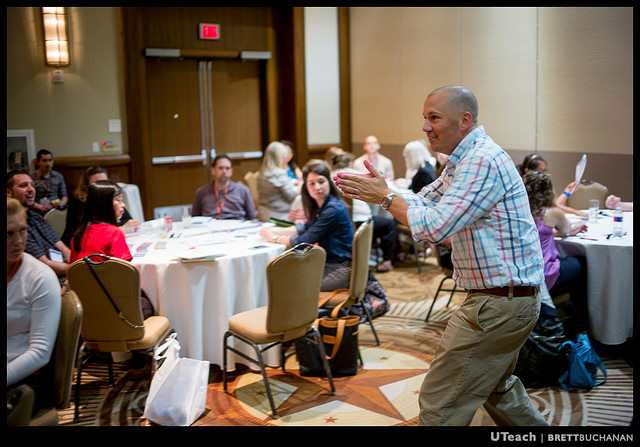Only for the Brave: Reflections from the Ninth Annual UTeach Conference
Laura DeMoss |
June 1, 2015
 Our development manager, Stephanie Markman, shares her reflections on the Ninth Annual UTeach Conference, which was held May 19-21 in Austin, Texas.
Our development manager, Stephanie Markman, shares her reflections on the Ninth Annual UTeach Conference, which was held May 19-21 in Austin, Texas.
NMSI's Jason Walker presenting at the 2015 UTeach Conference.In his keynote address of the Ninth Annual UTeach Conference, Robert Krulwich, co-host of NPR’s Radiolab, pronounced to a room full of educators and students, “This is not work for the un-brave.” While few may think of teaching science or math as work that requires bravery, he was absolutely right. The work of teaching science and math and the work of preparing excellent teachers requires ingenuity, passion, expertise, adaptability and, yes, bravery.
The annual UTeach Conference brings together the entire spectrum of people involved with UTeach, a unique program that is revolutionizing the way universities prepare math and science teachers. The UTeach model, currently in place at 44 universities across the country, involves a collaborative partnership between colleges of science and education that allows students to graduate from college in four years with both a STEM degree and teaching certification. With support from NMSI, the program is expanding to help prepare the next generation of STEM teachers with the deep content knowledge and pedagogical understanding they need as they prepare to enter the classroom.
Professors, master teachers, finance teams, development officers, funders and university students converged at the University of Texas at Austin to collaborate and ensure the continued growth and success of the UTeach programs working to engage and inspire students in STEM learning. As we discussed issues like implementing new instructional practices and how to close achievement gaps in STEM fields, it became clear that the work being undertaken by UTeach students clearly requires bravery in stepping beyond the status quo.
While attending a session entitled, “Igniting the Flame of Learning in a Biology Classroom,” I saw this boldness in action. The session presenters were clearly on fire, eager to help teachers prepare their students for success in biology with an energy that I don’t recall ever seeing in a high school science class. In the course of an hour, the presenters Jason Walker, a former AP biology teacher and current NMSI program manager, and Paulette Evens, a UTeach master teacher at the University of Alabama at Birmingham, didn’t just demonstrate how to engage students. They made attendees do the work. Their energy was boundless and the effect on the adults in the room (all of whom already know about biology) was both surprising and thrilling. Having attended many professional development sessions, I didn’t expect such deep teacher engagement, such applicable classroom practices, and such simple, yet effective new ways to teach a subject that I know I found difficult at times.
In all of the sessions I attended related specifically to instruction, I was reminded that teaching math and science is by no means a dull career path. Sessions like “The Maker Movement, 3D Printing and STEM Education” and “Collaborative Mathematics: Problem Solving Across the Globe” challenged attendees to think outside of the box as they look for innovative ways to get students engaged and excited about STEM. Every session I attended was filled with soon-to-be teachers asking questions, chiming in with new ideas to add on to or enhance the strategies being presented. Presenters showed both new and seasoned teachers how to foster inquiry-based learning in their classrooms – even in math. As a former English teacher, this was unchartered territory for me. Inquiry in a math classroom? Connecting photosynthesis to evolution? Not following the sequence provided in a textbook? All these things are not only OK, but encouraged. Our newest teachers are passionate about making sure that their students have the same enthusiastic reaction that I did – one that sparks curiosity, an appreciation for math and science, and a desire to dig deeper.
Teaching these critical subjects with fearlessness and innovation is indeed work for those willing to think outside the box and create new ways for students to engage with challenging material. It is work for the brave.